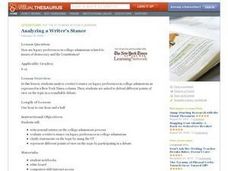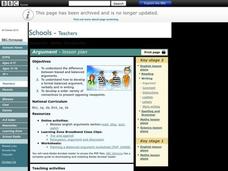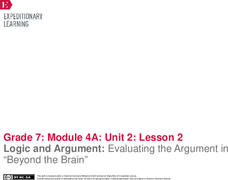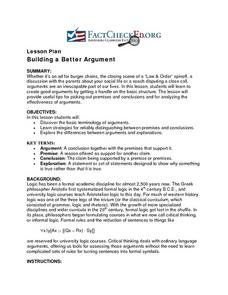Curated OER
Analyzing a Writer's Stance
Should college admissions decisions be based on whether whose family members attended? Secondary students read and respond to a New York Times article on the issue of 'legacy preferences' in college admissions. Following class...
Curated OER
"I Believe..." Podcast Style
Use this communication skills lesson to emphasize evaluating a speaker's main point and argument. After reading Martin Luther King's, "I Have a Dream Speech" and John F. Kennedy's speech, "I Believe in an America Where the Separation of...
Curated OER
Breaking Barriers
Determine how African-Americans have broken barriers in this history lesson. Middle schoolers discuss the 15th Amendment and the American civil rights movement prior to analyzing Barack Obama's speech "A More Perfect Union," taking care...
Media Smarts
Media Awareness Network: Hate or Debate?
Discuss the difference between legitimate debate on a political issue and arguments that are based on hate through a science-fiction scenario that shows how a controversial issue can be discussed in both ways. Then learn how purveyors of...
Curated OER
Argument of Policy
After investigating different policies within the school district, young reformers select a policy they would like to change. They then investigate the policy, and craft a letter in which they advocate a change to the policy. For guided...
Curated OER
Argument
Learners write and discuss opposing points of view. In this argument instructional activity, students learn to understand what an argument is and they get to argue one side of a disagreement. An alternative written assignment is...
Curated OER
Oral Arguments Online
Young scholars participate in their own mock oral arguments. They create their own opinions and discuss any opposing opinions. They write their own opinion for a case to end the lesson.
Turabian Teacher Collaborative
Introductions: Formulating Problem Statements
Describing a problem efficiently doesn't solve it, but a well-crafted argument can move readers to action. High schoolers focus on structuring problem statements by reading examples of strong essays and working in groups to create their...
University of North Carolina
Statistics
Let's see you back it up! As shown in the 18th handout in the Writing the Paper series of 24 lessons from UNC, statistics help form an effective argument. The handout discusses how to analyze a source and break down the data to ensure it...
Curated OER
Intermediate Making a Formal Argument: Practice
Does practice really make perfect? What is perfect, and how is it measured? Your aspiring writers will respond to the adage "Practice makes perfect." There's an example answer provided, but consider removing it to see what reasoning they...
Curated OER
Intermediate Making a Formal Argument: Giving and Receiving
Give your middle school writers the opportunity to form an opinion and provide strong supporting details. Writers will respond to the statement "It is better to give than to receive." This is a particularly good assignment to use if your...
EngageNY
Qualities of a Strong Literary Argument Essay
One activity, two essays, and one central theme: qualities of an argument essay. Here, scholars first describe the qualities of an argument essay regarding Bud's rules to live by from the novel Bud, Not Buddy by Christopher Paul Curtis....
University of Wisconsin
BEAM: Background, Exhibit, Argument, Method
Thinking of assigning a research paper? Get writers off on the right foot with a lesson that introduces the BEAM research model. Writers brainstorm the background of their topic, explicate the aspects of their topic, consider the...
EngageNY
Mid-Unit Assessment: Analyzing an Author’s Argument and Text Structure
William Shakespeare: a writer, a poet, a fake? For their mid-unit assessments, scholars read an excerpt from the article "The Top Ten Reasons Shakespeare Did Not Write Shakespeare" by Keir Cutler. Next, they analyze the author's argument...
EngageNY
Logic and Argument: Evaluating the Argument in “Beyond the Brain”
The brain is not the mind. Scholars explore the claim by reading an informational article about neuroscience research, "Beyond the Brain." As they read, they answer text-dependent questions and complete an anchor chart to evaluate...
EngageNY
Mid-Unit Assessment, Part 1: Tracing and Evaluating Arguments
It's test time! As part one of the mid-unit assessment, scholars complete a Tracing an Argument note-catcher for both a text and a video about the Internet's effect on the brain. Pupils demonstrate learning by evaluating the argument and...
Texas Education Agency (TEA)
Evaluating the Effectiveness of Arguments, i.e., Identify Fallacies (English III Reading)
A series of interactive exercises provide users with the ammunition they need to detect logical fallacies and defend themselves against persuasion. Learners read about 11 types of logical fallacies and identify the type used in sample...
EngageNY
Planning for Writing: Introduction and Conclusion of a Literary Argument Essay
After completing three body paragraphs of an argument essay about life's rules to live by from Bud, Not Buddy Christopher Paul Curtis, it's time to begin writing the introduction and conclusion. Independently, pupils draft the final two...
EngageNY
End of Unit 2 Assessment: Final Draft of Literary Argument Essay
Take the last step in writing a literary argument essay using Bud, Not Buddy by Christopher Paul Curtis in an activity focused on feedback. Using the stars and steps revision method, pupils consider teacher and peer feedback to revise...
Serendip
Soap Opera Genetics – Genetics to Resolve Family Arguments
Did she cheat on her husband? Did the hospital switch the babies? Should they have children? As much as this sounds like the plot for a soap opera, all of these questions fit into a single lesson on genetics. Scholars read about three...
EngageNY
Writing an Argument Essay: Planning the Essay
Pupils use a helpful resource to begin a Writing Improvement Tracker, developing awareness of their writing strengths and challenges. Additionally, they continue planning their argument essays about Shakespeare's A Midsummer Night's...
EngageNY
Evaluating an Argument: “Is Google Making Us Stupid?”
Does the Internet negatively affect peoples' brains? Scholars complete a Tracing an Argument note catcher to evaluate the question as they read the text "Is Google Making Us Stupid?" Exploring both sides of the issue, they add their...
Curated OER
Building a Better Argument
Students identify the major components of arguments. They deconstruct several arguments in order to relate the differences between premises and conclusions. Students review several documents and identify the way arguments can be...
Curated OER
The Game of Persuasion
Why is it so important to learn the art of persuasion? Being persuasive helps you acquire the things you want or the things you feel are necessary. Print out these scenarios and assign one to each group of high schoolers. As a team, they...
Other popular searches
- Persuasive Writing Arguments
- Pro Con Arguments
- Persuasive Arguments
- Writing Arguments
- Deductive Arguments
- Logical Arguments
- How to Write Arguments
- Effective Arguments
- Balanced Arguments
- Hypotheticals and Arguments
- Persuasive Argument Essay
- Persuasive Argument Template

























